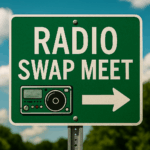Brownwood Amateur Radio Club
 Our fourth annual parking lot Tailgate Session will be May 16, 2026.
Our fourth annual parking lot Tailgate Session will be May 16, 2026.
Buy or sell that special item!
Dealer spaces are only $5.
First Christian Church in Brownwood at 2411 Coggin Avenue.
Bigger and better than last year!
For more info, contact Bill Patton at bill@ac5as.com
Our weekly Tuesday night net is on 146.940 MHz at 9:00 PM, 03:00 UTC. If you want to be added to the Net Control Roster rotation, contact Bill at bill@ac5as.com
| Date | Callsign | Net Control |
|---|---|---|
| Jan 13, 2026 | AC5AS | Bill |
| Jan 20, 2026 | KI5TLG | Nick |
| Jan 27, 2026 | AG5YQ | Les |
| Feb 3,2026 | WD9ARW | Rich |
| Feb 10,2026 | KJ5ERG | Newlin |
| Feb 17,2026 | AC5AS | Bill |
| Feb 24,2026 | KI5TLG | Nick |
| March 3, 2026 | AG5YQ | Les |
| March 10, 2026 | WD9ARW | Rich |
| March 17, 2026 | KJ5ERG | Newlin |
| March 24, 2026 | AC5AS | Bill |
| April 7,2026 | KI5TLG | Nick |
| April 14,2026 | AG5YQ | Les |
| April 21,2026 | WD9ARW | Rich |
| April 28,2026 | KJ5ERG | Newlin |
| May 5, 2026 | AC5AS | Bill |
| May12, 2026 | KI5TLG | Nick |
| May 19, 2026 | AG5YQ | Les |
| May 26, 2026 | WD9ARW | Rich |
| June 2,2026 | KJ5ERG | Newlin |
| June 9,2026 | AC5AS | Bill |
| June 16,2026 | KI5TLG | Nick |
We meet every 3rd Monday of the month at 7:00 PM at 2411 Coggin Avenue in Brownwood.
We also meet for breakfast every Friday morning at 8:00 AM. Our breakfast location varies, so check our Facebook page for the latest.